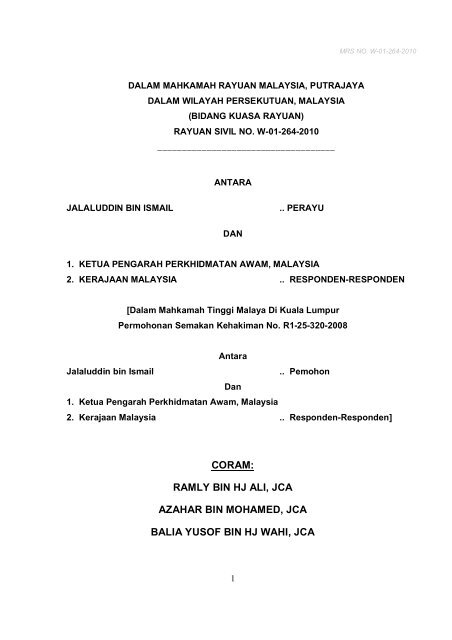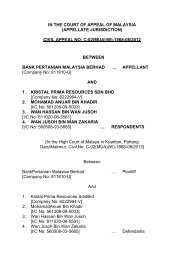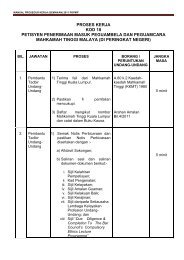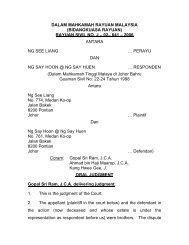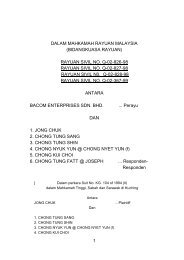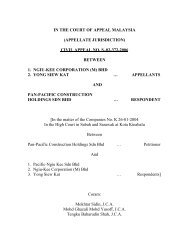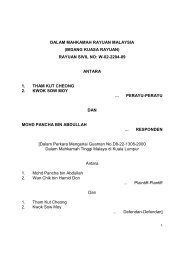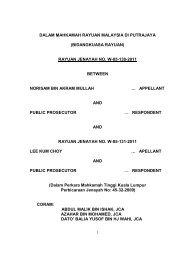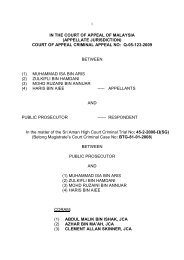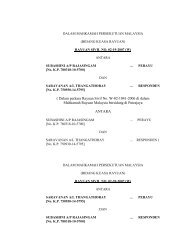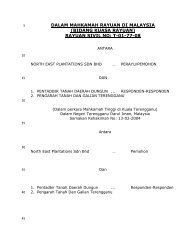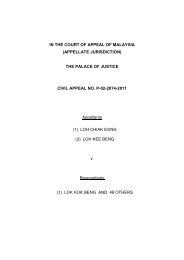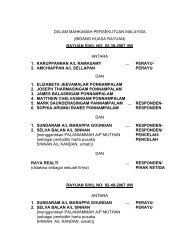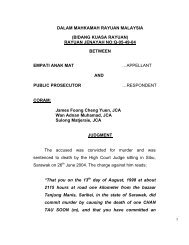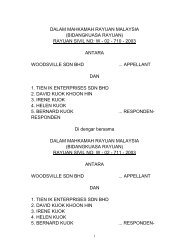ramly bin hj ali, jca azahar bin mohamed, jca balia yusof bin hj wahi ...
ramly bin hj ali, jca azahar bin mohamed, jca balia yusof bin hj wahi ...
ramly bin hj ali, jca azahar bin mohamed, jca balia yusof bin hj wahi ...
Create successful ePaper yourself
Turn your PDF publications into a flip-book with our unique Google optimized e-Paper software.
DALAM MAHKAMAH RAYUAN MALAYSIA, PUTRAJAYA<br />
DALAM WILAYAH PERSEKUTUAN, MALAYSIA<br />
(BIDANG KUASA RAYUAN)<br />
RAYUAN SIVIL NO. W-01-264-2010<br />
____________________________________<br />
ANTARA<br />
JALALUDDIN BIN ISMAIL .. PERAYU<br />
DAN<br />
1. KETUA PENGARAH PERKHIDMATAN AWAM, MALAYSIA<br />
1<br />
MRS NO. W-01-264-2010<br />
2. KERAJAAN MALAYSIA .. RESPONDEN-RESPONDEN<br />
[Dalam Mahkamah Tinggi Malaya Di Kuala Lumpur<br />
Permohonan Semakan Kehakiman No. R1-25-320-2008<br />
Antara<br />
Jalaluddin <strong>bin</strong> Ismail .. Pemohon<br />
Dan<br />
1. Ketua Pengarah Perkhidmatan Awam, Malaysia<br />
2. Kerajaan Malaysia .. Responden-Responden]<br />
CORAM:<br />
RAMLY BIN HJ ALI, JCA<br />
AZAHAR BIN MOHAMED, JCA<br />
BALIA YUSOF BIN HJ WAHI, JCA
JUDGMENT OF THE COURT<br />
2<br />
MRS NO. W-01-264-2010<br />
1. This is an appeal against the decision of the learned High<br />
Court judge dated 9 April 2010 dismissing with costs the<br />
Appellant’s application for judicial review dated 4 November<br />
2008 seeking inter <strong>ali</strong>a for an order of certiorari to quash the<br />
decision of the termination of service of the Appellant in public<br />
interest and a declaration that the purported termination of<br />
service of the Appellant was wrong in law, null and void.<br />
2. In full, the Appellant, at the stage of the High Court, sought the<br />
following reliefs, namely:<br />
a) an order for certiorari to quash the termination of service<br />
of the Appellant in the public interest pursuant to<br />
regulation 49(3) of the Public Officers (Conduct and<br />
Discipline), 1993; and also to quash the order under<br />
section 10(5)(d) of the Pensions Act, 1980<br />
communicated to the Appellant by letter dated 25<br />
September 2008 from the 1 st Respondent;
3<br />
MRS NO. W-01-264-2010<br />
b) a declaration that the purported termination of service of<br />
the Appellant communicated to the Appellant by letter<br />
dated 25 September 2008 under the hand of the 1 st<br />
Respondent is null and void and of no effect or<br />
consequence;<br />
c) an order for damages and loss incurred by the Appellant<br />
consequent upon the acts of the Respondents;<br />
d) an order directing reinstatement of the Appellant to the<br />
position he held at the time of the purported termination<br />
of service and any promotion he was entitled to<br />
thereafter;<br />
e) an order that the Deputy Registrar of High Court, Kuala<br />
Lumpur takes an account of all salaries, emoluments and<br />
other benefits the Appellant is entitled to as a<br />
consequence of his termination of service;<br />
f) interest on the adjudged sum on such rates and for such<br />
periods deemed fit and proper by the Honourable Court;<br />
and
g) costs.<br />
Factual background<br />
4<br />
MRS NO. W-01-264-2010<br />
3. The Appellant joined the public service on 3 May 1983. At the<br />
material time (when his service was terminated), he was<br />
holding the post of Ketua Penolong Pengarah, Institut Alam<br />
Sekitar Malaysia (EiMAS), Jabatan Alam Sekitar and was a<br />
public servant within the provisions of Article 132 (1)(c) of the<br />
Federal Constitution.<br />
4. The Appellant’s service was terminated with effect from 24<br />
October 2008 by a letter dated 25 September 2008 under the<br />
hand of the 1 st Respondent (Ketua Pengarah Perkhidmatan<br />
Awam Malaysia). The said letter, inter <strong>ali</strong>a was to the effect<br />
that the Government had decided to terminate the Appellant’s<br />
service in the public interest under Regulation 49(3) of the<br />
Public Officers (Conduct and Discipline) Regulations, 1993 (the<br />
1993 Regulations). It was also indicated in paragraph two in<br />
the said letter that acting under section 10(5)(d) of the<br />
Pensions Act 1980, the Yang di Pertuan Agong has decided
5<br />
MRS NO. W-01-264-2010<br />
that the Appellant retires in the public interest. For case of<br />
reference, the full text of the said letter is reproduced below:<br />
“ENCIK JALALUDDIN BIN ISMAIL<br />
(No. K/P: 590729-10-6233)<br />
Melalui dan s<strong>ali</strong>nan:<br />
Ketua Pengarah Alam Sekitar<br />
Jabatan Alam Sekitar Malaysia<br />
Kementerian Sumber Asli & Alam Sekitar<br />
Aras 3, Podium 3, Wisma Sumber Asli<br />
No. 25, Persiaran Perdana, Presint 4<br />
62574 W.P. PUTRAJAYA<br />
Tuan,<br />
Adalah saya memaklumkan bahawa Kerajaan telah memutuskan untuk<br />
menamatkan perkhidmatan tuan demi kepentingan awam di bawah<br />
Peraturan 49(3), Peraturan-Peraturan Pegawai Awam (Kelakuan dan<br />
Tatatertib) 1993 berkuat kuasa 24 Oktober 2008.<br />
2. Pada menjalankan kuasa di bawah seksyen 10(5)(d), Akta Pencen<br />
1980, Seri Paduka Baginda Yang di Pertuan Agong telah memutuskan<br />
bahawa tuan dikehendaki bersara demi kepentingan awam. Tarikh kuat<br />
kuasa persaraan itu ialah pada 24 Oktober 2008.<br />
3. Tuan boleh mengambil dan menghabiskan kesemua cuti rehat<br />
yang tuan layak sebanyak 16 hari bermula pada 30 September 2008.<br />
Urusan pencen tuan akan diuruskan mengikut Akta Pencen 1980.<br />
Sekian, terima kasih.<br />
“BERKHIDMAT UNTUK NEGARA”<br />
t.t.<br />
(TAN SRI ISMAIL ADAM)<br />
Ketua Pengarah Perkhidmatan Awam<br />
Malaysia. “
6<br />
MRS NO. W-01-264-2010<br />
5. The Appellant contended that the termination of his service is<br />
null and void and of no effect. The Appellant then applied for<br />
judicial review under Order 53 of the Rules of the High Court<br />
1980. On 9 April 2010 the High Court dismissed his<br />
application with costs of RM10,000 to the 2 nd Respondent.<br />
Dissatisfied with the decision, the Appellant appealed to the<br />
Court of Appeal. Hence the present appeal.<br />
At the Court of Appeal<br />
6. The Appellant raised sixteen grounds in his Memorandum of<br />
Appeal before us. For ease of reference all the grounds can<br />
be summarized into three main issues, namely:<br />
a) whether the Respondents had complied with Regulation<br />
49 of the 1993 Regulations failing which will render the<br />
termination null and void and of no effect (grounds 1, 2,<br />
3, 4, 5, 9, 11, 12, 14, 15 and 16) (1 st Issue);<br />
b) whether the 1 st Respondent is the authority to convey the<br />
decision of the Yang di Pertuan Agong (grounds 6, 7 and<br />
13) (2 nd Issue); and
7<br />
MRS NO. W-01-264-2010<br />
c) whether the 1 st Respondent is the proper disciplinary<br />
authority within the definition of ‘Disciplinary Authority’ in<br />
Regulation 3 of the 1993 Regulations (grounds 8 and 10)<br />
(3 rd Issue).<br />
The Appellant’s contentions<br />
7. The learned counsel for the Appellant argued that before the<br />
Appellant’s service could be lawfully terminated under<br />
regulation 49(3) of the 1993 Regulations, there must be strict<br />
compliance with the provisions of regulations 49(1) and (2), the<br />
fulfillment of which was a condition precedent to any action<br />
under regulation 49(3); and the decision – making process in<br />
relation to the termination of service in the provisions of<br />
regulation 49 had to be complied with failing which the court<br />
had the jurisdiction to declare the termination unlawful and<br />
inv<strong>ali</strong>d.<br />
8. In relation to the above issue, the Appellant further contended<br />
that:
8<br />
MRS NO. W-01-264-2010<br />
a) the letter dated 25 September 2008 (informing him of the<br />
termination) is null and void, and no effect as there is no<br />
indication in the said letter at all that the provisions of<br />
regulations 49(1) and (2) have been complied with; there<br />
is no indication whatsoever of the grounds of the 2 nd<br />
Respondent’s satisfaction in relation to the Appellant’s<br />
work and conduct or in anyway whatever that it was<br />
desirable in the public interest to terminate the<br />
Appellant’s service; in any event the said letter only<br />
adverts to regulation 49(3);<br />
b) the Appellant has not been supplied a copy of the report,<br />
if any, or had been appraised in any way otherwise of the<br />
contents of the report from the Appellant’s head of<br />
department upon which the 2 nd Respondent was satisfied<br />
that the Appellant’s service should be terminated in the<br />
public interest in contravention of the rules of natural<br />
justice;<br />
c) there was no basis for the 2 nd Respondent to terminate<br />
his service because in the course of his employment he
9<br />
MRS NO. W-01-264-2010<br />
had not at any time been disciplined in relation to his<br />
conduct or his work being unsatisfactory or in being<br />
anyway blameworthy in the course of his employment;<br />
he has been bestowed several decorations in 1997, 1999<br />
and 2001; the termination of his service in the public<br />
interest has not been properly effected and consequently<br />
the action of the Yang di Pertuan Agong requiring him to<br />
retire from the public service under section 10(5)(d) of<br />
the Pensions Act 1980 is unsupportable in law as the<br />
Yang di Pertuan Agong could not have had any material<br />
before him to act under the provisions of the said section;<br />
d) the communication by the 1 st Respondent of the act of<br />
the Yang di Pertuan Agong requiring the Appellant to<br />
retire in the public interest is not supportable in law as<br />
the 1 st Respondent is not the authority, in law, to convey<br />
the decision of the Yang di Pertuan Agong;<br />
e) the Appellant has been subjected to abuse of power and<br />
mala fides as he was isolated and accorded no work<br />
from January 2005 right up to the date of his termination
10<br />
MRS NO. W-01-264-2010<br />
- these evidence of abuse of power and mala fides would<br />
render his termination of service in the public interest null<br />
and void and of no effect;<br />
f) there has been contravention of the provisions of Article<br />
144 (5A) proviso (b) of the Federal Constitution in that<br />
the 1 st Respondent was not the lawful disciplinary<br />
authority within the meaning of “Disciplinary Authority’ in<br />
regulation 3 of the 1993 Regulations.<br />
9. The Appellant also queried “on whose advice did the Yang di<br />
Pertuan Agong act on” in exercising the power under section<br />
10(5)(d) of the Pensions Act 1980 in terminating his service in<br />
the public interest. The Appellant submitted that if it was the<br />
Yang di Pertuan Agong who made the decision to terminate,<br />
then the termination of the Appellant ought to have been<br />
communicated by the Prime Minister and not by the 1 st<br />
Respondent.<br />
The Respondent’s contentions<br />
10. The learned Senior Federal Counsel for the Respondents,<br />
referred to Article 132(2A) of the Federal Constitution which
11<br />
MRS NO. W-01-264-2010<br />
provides that a public officer holds office during the pleasure of<br />
the Yang di Pertuan Agong. To strengthen his submission on<br />
this point, the learned Senior Federal Counsel referred to the<br />
decision of the Federal Court in the case of Pengarah<br />
Pelajaran Wilayah Persekutuan & Ors. v Loot Ting Yee<br />
[1982] 1 MLJ 68 wherein Salleh Abas FJ (as he then was) said<br />
inter <strong>ali</strong>a:<br />
“The law relating to civil service in Malaysia is based<br />
upon a twin principle that every employee holds office<br />
during the pleasure of the Yang di Pertuan Agong and<br />
that the qu<strong>ali</strong>fications for appointment and conditions of<br />
service are regulated by him, in addition and subject to<br />
any law on the same subject matters having been made<br />
by the Parliament.”<br />
11. The Respondents also submitted that it is the Yang di Pertuan<br />
Agong who is the authority to decide whether the Appellant’s<br />
service is still required or should be terminated in public<br />
interest under regulation 49(1) and (3) of the 1993 Regulations,<br />
based on the report and recommendation made by the head of
12<br />
MRS NO. W-01-264-2010<br />
department; the 1 st Respondent’s duty is to forward a<br />
memorandum to present the relevant report for the Yang di<br />
Pertuan Agong’s consideration; therefore the 1 st Respondent<br />
has acted in accordance with regulations 49(1) and (3) of the<br />
1993 Regulations.<br />
Decision of this court<br />
12. The present appeal revolves mainly on the interpretation of<br />
regulation 49 of the Public Officers (Conduct and Discipline)<br />
Regulations 1993, (the 1993 Regulations) which reads as<br />
follows:<br />
“Termination in the public interest<br />
49. (1) Notwithstanding any provision in these<br />
Regulations, where the Government finds or where<br />
representations are made to the Government that it<br />
is desirable that the service of an officer be<br />
terminated in the public interest, the Government<br />
may call for a full report from the Head of<br />
Department in which the officer is or has been<br />
serving.
13<br />
MRS NO. W-01-264-2010<br />
(2) The report referred to in sub regulation (1) shall<br />
contain particulars relating to the work and conduct<br />
of the officer and the comments, if any, of the Head<br />
of Department.<br />
(3) if, after considering the report received under the<br />
sub regulation (1), the Government is satisfied that,<br />
having regard to the conditions of the service, the<br />
usefulness of the officer to the service, the work,<br />
the conduct of the officer and all the other<br />
circumstances of the case, it is desirable in the<br />
public interest so to do, the Government may<br />
terminate the service of the officer with effect from<br />
such date as the Government shall specify.<br />
(4) It shall be lawful for the appropriate Disciplinary<br />
Authority to recommend to the Government that the<br />
service of an officer be terminated in the public<br />
interest notwithstanding that disciplinary<br />
proceedings have not been carried out under any<br />
of the provisions of these Regulations; and the
14<br />
MRS NO. W-01-264-2010<br />
Government may so terminate the service of such<br />
officer.<br />
(5) Notwithstanding anything in these Regulations and<br />
any other law to the contrary, in terminating the<br />
service of any officer in the public interest under<br />
the regulation, such officer may not be given any<br />
opportunity of being heard and an officer whose<br />
service has been terminated in the public interest<br />
under this regulation shall not for the purpose of<br />
Article 135(2) of the Federal Constitution, be<br />
regarded as having been dismissed, regardless of<br />
whether such termination of the service of the<br />
officer involved an element of punishment or was in<br />
connection with conduct in relation to his office<br />
which the Government regards as unsatisfactory or<br />
blameworthy.”<br />
13. The 1993 Regulations were made by the Yang di Pertuan<br />
Agong pursuant to Article 132(2) of the Federal Constitution,<br />
which reads:
“ (1) …………………….<br />
15<br />
MRS NO. W-01-264-2010<br />
(2) Except as otherwise expressly provided by this<br />
Constitution, the qu<strong>ali</strong>fications for appointment and<br />
conditions of service of persons in the public services<br />
other than those mentioned in paragraph (g) of Clause<br />
(1) may be regulated by federal law and, subject to the<br />
provisions of any such law, by the Yang di Pertuan<br />
Agong; and the qu<strong>ali</strong>fications for appointment and<br />
conditions of service of persons in the public service of<br />
any State may be regulated by State law and, subject to<br />
the provisions of any such law, by the Ruler or Yang<br />
di Pertua Negeri of that State.”<br />
14. In short, Article 132(2) provides that the qu<strong>ali</strong>fications for<br />
appointment and conditions of service of persons in the public<br />
services may be regulated by federal law and subject to the<br />
provisions of any such law, by the Yang di Pertuan Agong.<br />
Regulation 49 of the 1993 Regulations is one of the regulations<br />
governing the conditions of service of persons in the related<br />
public services particularly on termination in the public interest.
16<br />
MRS NO. W-01-264-2010<br />
15. Article 132(2A) of the Federal Constitution provides that a<br />
public officer holds office during the pleasure of the Yang di-<br />
Pertuan Agong. The said Article 132(2) reads:<br />
“(2A) Except as expressly provided by this<br />
Constitution, every person who is a member of any of the<br />
services mentioned in paragraphs (a), (b), (c), (d), (f) and<br />
(h) of Clause (1) holds office during the pleasure of the<br />
Yang di-Pertuan Agong and except as expressly<br />
provided by the Constitution of the State, every person<br />
who is a member of the public service of a State holds<br />
office during the pleasure of the Ruler or Yang di Pertua<br />
Negeri.”<br />
16. The Federal Court’s decision in the case of Haji Ariffin v<br />
Government of Pahang [1968] 1 LNS 45 is a clear authority<br />
on the principle that every member of the public service holds<br />
office during the pleasure of the Yang di Pertuan Agong or<br />
Ruler of State (as the case may be). In that case, Raja Azlan<br />
Shah J, (as His Majesty then was) expressed:
17<br />
MRS NO. W-01-264-2010<br />
“Art 132(2A) has, subject to exceptions expressly<br />
provided by Federal and State Constitutions, adopted the<br />
English common law that every person who is a member<br />
of the public service of the Federal or of a State<br />
Government holds office during the pleasure of the Yang<br />
di Pertuan Agong or the Ruler or Governor as the case<br />
may be. The express exceptions are clearly embodied in<br />
art 135 which put a check on the unabridged exercise of<br />
pleasure. The pleasure of the Yang di Pertuan Agong, or<br />
the Ruler of Governor, would still be there, but it has to<br />
be exercised in accordance with the statutory obligations<br />
of art 135, and it is the breach of these obligations that<br />
afford a cause of action. If the termination of service<br />
does not violate the provisions of art 135, this court is not<br />
competent to quash an order terminating the service<br />
under item 1 of the First Schedule to the Courts<br />
Judicature Act, 1964.”<br />
17. Regulation 49 of the 1993 Regulations talks about termination<br />
of service in the public interest. The authority who has the<br />
power to terminate the service of an officer under the said
18<br />
MRS NO. W-01-264-2010<br />
regulation is the Government of Malaysia – the 2 nd Respondent<br />
in the present appeal. In the Federal Court case of<br />
Balakrishnan v Ketua Pengarah Perkhidmatan Awam<br />
[1981] 2 MLJ 259, the Government of Malaysia had decided to<br />
terminate the Appellant’s service in the public interest under<br />
section 10(d) of the Pensions Ordinance and General Order<br />
44; and the termination was conveyed to the Appellant by the<br />
Director of Public Services. The Appellant brought an action<br />
for a declaration that the termination of his service in the public<br />
interest was void, inoperative and of no effect. One of the<br />
grounds of appeal in that case was that the requirement for the<br />
Appellant to retire from the public service on the termination of<br />
his employment in the public interest could only be exercised<br />
by the Yang di Pertuan Agong as required and not by the<br />
Government of Malaysia as intimated by the Director of Public<br />
Services and accordingly vitiated the exercise of the power<br />
under the statutory provisions.<br />
18. In his judgment, Abdoolcadar J. (as he then was) said as<br />
follows:
19<br />
MRS NO. W-01-264-2010<br />
“[19] ……….. The Yang di Pertuan Agong is a<br />
constitutional monarch and is required under Article<br />
40(1) of the Constitution in the exercise of his functions<br />
(except on certain matters that do not concern this<br />
appeal) to act in accordance with collective or individual<br />
ministerial advice and not on his own initiative (Teh<br />
Cheng Poh <strong>ali</strong>as Char Meh v Public Prosecutor,<br />
Malaysia [1979] 1 MLJ 50; [1980] AC 458 (at pages 466<br />
473). In view of this, the reference to the 2 nd Respondent<br />
in the letter in question is not more than a loose use of<br />
the term to encapsulate the decision of the Yang di<br />
Pertuan Agong for the purposes of section 10 of the<br />
Pensions Ordinance and this view is reinforced by the<br />
proper presumption that can be made in this respect by<br />
the reference in the letter of October 13, 1971 of the<br />
termination having been effected under section 10(d) of<br />
the Pensions Ordinance which specifically refers to the<br />
power of the Yang di Pertuan Agong to require an officer<br />
to retire from the public service on the termination of his<br />
employment in the public interest. Section 10 of the
20<br />
MRS NO. W-01-264-2010<br />
Pensions Ordinance must be read in the light of section 8<br />
thereof, subsection (1) of which provides that no pension<br />
shall be granted under the Ordinance to any officer until<br />
he shall have retired from the public service and<br />
subsection (2) whereof is in like terms as section 10 of<br />
the Ordinance in prescri<strong>bin</strong>g that no pension shall be<br />
granted to any officer who has retired from the public<br />
service otherwise than as specified therein. Further<br />
support for the presumption of the Yang di Pertuan<br />
Agong’s exercise of his power on ministerial advice again<br />
appears in the letter of October 13, 1971 which goes on<br />
the state that the question of the Appellant’s eligibility for<br />
a pension would be dealt with under the Pensions<br />
Ordinance and also in the subsequent letter of May 5,<br />
1972 indicating that when approval as to the Appellant’s<br />
pension factor was received action would be taken for<br />
the pension to be paid to him.<br />
[21] When we speak of the Government, we refer to His<br />
Majesty’s Government which includes His Majesty the<br />
Yang di Pertuan Agong and of which he is the
21<br />
MRS NO. W-01-264-2010<br />
constitutional head. The reference therefore to the 2 nd<br />
Respondent in the letter of October 13, 1971 is<br />
sufficiently comprehensive to manifest the Yang di<br />
Pertuan Agong’s participation in the decision made and<br />
would appear to be no more than a composite term to<br />
intimate the exercise by the Yang di Pertuan Agong of<br />
his powers under section 10 of the Pensions Ordinance<br />
on ministerial advice, and the communication by the 1 st<br />
Respondent of the decision so made by the 2 nd<br />
Respondent is only indicative, to use the words of<br />
Brightman J., in In re Golden Chemical Products Ltd<br />
[1976] Ch 300 (at page 307), 307 applying the law as<br />
explained by Lord Greene M.R., in Carltona, Ltd v<br />
Commissioners of Works & Ors [1943] 2 All ER 560 (at<br />
page 563), 563 of ‘a devolution of power – delegation is<br />
the wrong word’. In Lim Lian Geok v The Minister of the<br />
Interior, Federation of Malaya [1964] MLJ 158 it was<br />
accepted before the Privy Council that a notice of<br />
intended deprivation of citizenship was not in any way<br />
inv<strong>ali</strong>d because it was signed by the Registrar-General of
22<br />
MRS NO. W-01-264-2010<br />
Citizens and the contention that there had been a<br />
delegation by the Minister was abandoned; these were<br />
points of argument taken unsuccessfully in the courts<br />
below.<br />
[22] We cannot but reject in the circumstances the<br />
argument advanced that the Yang di Pertuan Agong did<br />
not in fact require the Appellant to retire from the public<br />
service on the termination of his employment in the<br />
public interest under section 10(d) of the Pensions<br />
Ordinance.<br />
[23] In any event, even assuming for a moment for the<br />
sake of argument that the termination of the Appellant’s<br />
service involves any punitive element or can be<br />
impugned on the basis of the contentions advanced, but<br />
we find it does not and cannot, the position is covered by<br />
the further proviso inserted in Article 135(2) of the<br />
Constitution on December 31, 1978 and made effective<br />
retrospectively as from August 31, 1957 to the effect that<br />
the termination of the service of a public officer in the<br />
public interest does not constitute dismissal on the
23<br />
MRS NO. W-01-264-2010<br />
grounds relied on by the Appellant. This proviso would<br />
accordingly, if the Appellant had any just cause for<br />
complaint, deprive him of any relief or remedy.”<br />
19. In the present case, the relevant termination letter dated 25<br />
September 2008, at paragraph (1) clearly indicates that it was<br />
the Government who had decided to terminate the Appellant’s<br />
service in the public interest pursuant to regulation 49(3) of the<br />
1993 Regulations: “Adalah dimaklumkan bahawa kerajaan<br />
telah memutuskan untuk menamatkan perkhidmatan tuan demi<br />
kepentingan awam di bawah Peraturan 49(3), Peraturan-<br />
Peraturan Pegawai Awam (Kelakuan dan Tatatertib) 1993<br />
berkuat kuasa 24 Oktober 2008”.<br />
20. Even though the said letter was signed by one Tan Sri Ismail<br />
Adam (the 1 st Respondent in the present appeal), it did not<br />
inv<strong>ali</strong>date the decision to terminate the service of the<br />
Appellant. The decision was not his decision. The decision<br />
was properly made and the power to terminate was properly<br />
exercised by the Government as provided for under regulation
24<br />
MRS NO. W-01-264-2010<br />
49(3); and by the Yang di Pertuan Agong under section<br />
10(5)(d) of the Pensions Act 1980.<br />
21. The termination proceedings under regulation 49 can be<br />
initiated by the Government itself or through representations<br />
made to the Government: “where the Government finds or<br />
where representations are made to the Government”. The<br />
findings or the representations made to the Government must<br />
relate that “it is desirable that the service of an officer be<br />
terminated in the public interest.” That is the starting point for<br />
a proceeding to be initiated under regulation 49.<br />
22. Once the Government has entertained such a finding or<br />
representation, the next procedural step to be done is for the<br />
Government to call for a full written report from the head of<br />
department in which the officer is or has been serving. The<br />
said report shall contain particulars relating to the work and<br />
conduct of the officer and the comments, if any, of the head of<br />
department.<br />
23. The Government may terminate the service of the officer if the<br />
Government is satisfied it is desirable in the public interest so
25<br />
MRS NO. W-01-264-2010<br />
to do, after having regard to the conditions of the service, the<br />
usefulness of the officer to the service, the work and the<br />
conduct of the officer and all other circumstances of the case.<br />
The termination may take effect from such date as the<br />
Government shall specify. The satisfaction relates to the<br />
satisfaction of the Government. It is for the Government to<br />
decide on the desirability of the termination. The Government<br />
is not legally obliged to give reason to any party as to what<br />
considerations have fulfilled its satisfaction or what is the<br />
degree of its satisfaction. In the present case, the letter dated<br />
25 September 2008 clearly indicates that it was the<br />
Government (the 2 nd Respondent) who had decided to<br />
terminate the service of the Appellant, not the 1 st Respondent,<br />
or any other disciplinary authority. Thus, the requirements for<br />
‘satisfaction’ and termination of the service as required under<br />
regulation 49 of the 1993 Regulations had been complied with.<br />
There is no procedural irregularity committed by the<br />
Respondents in the proceedings.<br />
24. The Disciplinary Authority has no effective part to play in the<br />
proceedings. It has no active role – except, as provided under
26<br />
MRS NO. W-01-264-2010<br />
regulation 49(4) of the 1993 Regulations which reads: “it shall<br />
be lawful for the appropriate Disciplinary Authority to<br />
recommend to the government that the service of an officer be<br />
terminated in the public interest notwithstanding that<br />
disciplinary proceedings have not been carried out under any<br />
of the provisions of the Regulations”. The recommendation of<br />
the Disciplinary Authority is not mandatory in all cases. The<br />
Government may decide on its own even without any<br />
recommendation from the Disciplinary Authority. The<br />
Government is not legally bound to follow whatever<br />
recommendation made by the Disciplinary Authority. This is<br />
just to stress that the role of the appropriate Disciplinary<br />
Authority in the subject matter is very minimal.<br />
25. The termination proceeding under regulation 49 is different<br />
from any other forms of disciplinary proceedings under the<br />
1993 Regulations. Unlike any other forms of disciplinary<br />
proceedings, the termination proceedings under regulation 49<br />
provides no right to the officer involved to be given opportunity<br />
of being heard and the said officer in question whose service<br />
has been terminated in the public interest under regulation 49
27<br />
MRS NO. W-01-264-2010<br />
shall not for the purpose of Article 135(2) of the Federal<br />
Constitution be regarded as having been dismissed, regardless<br />
of whether such termination of the service of the officer<br />
involved an element of punishment or was in connection with<br />
conduct in relation to his office which the Government regards<br />
as unsatisfactory or blameworthy. This is clearly provided for<br />
in regulation 49(5) of the Regulations. That being the case, all<br />
the protections and remedies available under Article 135 of the<br />
Federal Constitution is not applicable and not available to an<br />
officer whose service is being terminated in the public interest<br />
under regulation 49, as in the present case. Therefore, the<br />
Appellant’s complaint that he has not been supplied with a<br />
copy of the report, if any or had not been appraised in any way<br />
otherwise of the contents of the report from the Appellant’s<br />
head of department upon which the Government was satisfied<br />
that the Appellant’s service should be terminated in the public<br />
interest, cannot hold water and not supported by law.<br />
26. Section 10(5)(d) of the Pensions Act 1980 talks about<br />
“retirement” of any public officer from the public service on the<br />
ground that the officer’s employment has been terminated in
28<br />
MRS NO. W-01-264-2010<br />
the public interest which must have been done by the<br />
Government under regulation 49 of the 1993 Regulations.<br />
Section 10(5)(d) of the Act reads as follows:<br />
“(5) The Yang di Pertuan Agong, in the case of a federal<br />
officer or a local federal officer, or the State<br />
Authority, in the case of a state officer, may require<br />
any officer to retire from the public service-<br />
(d) on the ground that the officer’s employment<br />
has been terminated in the public interest.”<br />
The power under section 10(5)(d) is to be exercised by the<br />
Yang di Pertuan Agong, in the case of a federal officer.<br />
‘Retirement’ under section 10(5)(d) is to facilitate granting of<br />
pension payment to the officer in question. It empowers the<br />
Yang di Pertuan Agong to request any public officer to retire<br />
from the public office on the ground that the officer’s<br />
employment has been terminated in the public interest. Before<br />
the powers under section 10(5)(d) can be invoked the service<br />
of the officer in question must has been first terminated by the<br />
Government. In the unreported Court of Appeal case of
29<br />
MRS NO. W-01-264-2010<br />
Rasasingam a/l Rasiah v Kerajaan Malaysia (Rayuan Sivil<br />
No. P-01-75-2001) the Court of Appeal said inter <strong>ali</strong>a that “in<br />
any event, the word “may” in the main part of section 10(5), in<br />
the context of its use in that section, imports an element of<br />
empowerment or enabling rather than a discretion”.<br />
27. An officer whose service has been terminated in the public<br />
interest under regulation 49 of the 1993 Regulations can only<br />
be accorded payment of pension after he has been required to<br />
retire in the public interest by the Yang di Pertuan Agong under<br />
section 10(5)(d) of the Pensions Act 1980. Only then pension<br />
can be granted to him by the Yang di Pertuan Agong under<br />
section 13 of the same Act which provides:<br />
“Retirement in the public interest<br />
“13. The Yang di Pertuan Agong may, if he thinks fit,<br />
grant a pension, gratuity or other benefit to an<br />
officer who is retired under paragraph 10(5)(d) or<br />
paragraph 10(5)(f), but the amount shall not<br />
exceed that for which such officer would be eligible<br />
had his pension, gratuity or other benefit been
30<br />
MRS NO. W-01-264-2010<br />
calculated based on his actual length of reckonable<br />
service.”<br />
28. Again, the granting of such a pension is not an absolute right to<br />
the officer. It is granted at the discretion of the Yang di<br />
Pertuan Agong “if he thinks fit”. The officer in question will not<br />
be eligible to be granted pension if he is not required to retire<br />
under section 10(5)(d) of the Pensions Act 1980.<br />
29. The Appellant also raised the issue that if it was the Yang di<br />
Pertuan Agong as the authority exercising the power under<br />
regulation 49 of the 1993 Regulations as well as section<br />
10(5)(d) of the Pension Act 1980, then the Yang di Pertuan<br />
Agong under the circumstances would not be acting in his<br />
personal capacity but on executive advice pursuant to Article<br />
40(1A) of the Federal Constitution. The Appellant queried on<br />
whose advice did the Yang di Pertuan Agong act on since<br />
there is nothing in the affidavit of the 1 st Respondent to reflect<br />
this. The Appellant also submitted that if it was the Yang di<br />
Pertuan Agong who made the decision to terminate the service<br />
and to retire the Appellant then the said decision ought to have
31<br />
MRS NO. W-01-264-2010<br />
been communicated by the Prime Minister and not by the 1 st<br />
Respondent.<br />
30. The Yang di Pertuan Agong is a constitutional monarch and is<br />
required under Article 40(1) of the Federal Constitution in the<br />
exercise of his functions to act in accordance with collective or<br />
individual ministerial advice. (see: Balakrishnan v Ketua<br />
Pengarah Perkhidmatan Awam Malaysia and the<br />
Government of Malaysia (supra); and Teh Cheng Poh <strong>ali</strong>as<br />
Char Meh v Public Prosecutor, Malaysia [1979] 1 MLJ 50,<br />
[1980] AC 458). The reference therefore to the 2 nd<br />
Respondent (the Government) in the letter of termination dated<br />
25 September 2008 is sufficiently comprehensive to manifest<br />
the Yang di Pertuan Agong’s participation in the decision<br />
made. The contents of the said letter sufficiently indicate that<br />
the Yang di Pertuan Agong had exercise his power on<br />
ministerial advice; and the communication by the 1 st<br />
Respondent of the decision so made by the Yang di Pertuan<br />
Agong is only indicative of ‘a devolution of power’ – the term<br />
aptly used by Abdoolcader J in Balakrishnan’s case. Further<br />
support for the presumption of the Yang di Pertuan Agong’s
32<br />
MRS NO. W-01-264-2010<br />
exercise of his power on ministerial advice also appears in the<br />
termination letter dated 25 September 2008 which states that<br />
the Appellant’s eligibility for a pension would be dealt with<br />
under the Pensions Act 1980: “Urusan pencen tuan akan<br />
diuruskan mengikut Akta Pencen 1980”. (The same line of<br />
presumption was also adopted by the Federal Court in<br />
Balakrishnan’s case).<br />
31. Based on the above mentioned authorities, we are satisfied<br />
that there are strong presumptions that the Yang di Pertuan<br />
Agong had exercised his powers under regulation 49 of the<br />
1993 Regulations as well as section 10(5)(d) of the Pensions<br />
Act 1980, on ministerial advice. The 1 st Respondent, by virtue<br />
of his post as the Director-General of Public Services whose<br />
duty is to call for and to receive any representation and to<br />
obtain full report from the Appellant’s head of department, and<br />
later to present them to the Yang di Pertuan Agong for His<br />
Majesty’s consideration and assent, is therefore also the same<br />
person who would notify the Appellant of the decision of the<br />
Yang di Pertuan Agong on the matter. We are of the view that<br />
the role of the 1 st Respondent is purely administrative in nature
33<br />
MRS NO. W-01-264-2010<br />
and it does not in any way render the termination of the<br />
Appellant’s service inv<strong>ali</strong>d. The Appellant’s contention that the<br />
Prime Minister should be the authority to convey the decision<br />
of the Yang di Pertuan Agong therefore lacks merit.<br />
32. In the present case, the 1 st Respondent had strictly complied<br />
with the procedural requirements under regulation 49 of the<br />
1993 Regulations. He had called for full report from the<br />
Appellant’s head of department; received the full report<br />
submitted by the head of department; prepared his report on<br />
the matter; and the reports were presented to the Yang di<br />
Pertuan Agong for His Majesty’s consideration and assent for<br />
termination of the Appellant’s service in the public interest.<br />
The 1 st Respondent’s duty is only to present the full report to<br />
the Yang di Pertuan Agung. He is not the authority who<br />
decides on the contents of the report. Instead, the report and<br />
the recommendation were prepared by the Appellant’s head of<br />
department. It is the Yang di Pertuan Agong who is the<br />
authority to decide whether the Appellant’s service is to be<br />
terminated in the public interest or not under regulation 49 of<br />
the 1993 Regulations. There is no requirement under
34<br />
MRS NO. W-01-264-2010<br />
regulation 49 that the Appellant’s statements be part of the<br />
contents of the reports presented to the Yang di Pertuan<br />
Agong. Also, there is no requirement in law that the Appellant<br />
be given a copy of the said reports before they were presented<br />
to the Yang di Pertuan Agong.<br />
33. The Appellant finally raised the issue whether the 1 st<br />
Respondent is the proper disciplinary authority within the<br />
definition of “Disciplinary Authority” in regulation 3 of the 1993<br />
Regulations. We note that this issue is not really relevant for<br />
consideration in the present appeal. It is not in dispute that the<br />
termination of the Appellant’s service in the public interest was<br />
made under regulation 49 of the 1993 Regulations; and for that<br />
matter he was required to retire by the Yang di Pertuan Agong<br />
under section 10(5)(d) of the Pensions Act 1980.<br />
Substantively, the appropriate Disciplinary Authority has no<br />
active role to play in the proceeding under regulation 49. The<br />
basic procedures under regulations 49(1) and (3) do not<br />
involve the role of an appropriate Disciplinary Authority. The<br />
preparation of full report containing particulars relating to the<br />
work and conduct of the officer and comments are made by the
35<br />
MRS NO. W-01-264-2010<br />
head of department; presented to the Yang di Pertuan Agong<br />
by the 1 st Respondent as the Director-General of Public<br />
Services for His Majesty’s consideration and assent. The role<br />
of the appropriate Disciplinary Authority is very minimal and not<br />
mandatory, as stated in regulation 49 (4) – to the effect that “it<br />
shall be lawful for the appropriate Disciplinary Authority to<br />
recommend to the Government that the service of an officer be<br />
terminated in the public interest notwithstanding that<br />
disciplinary proceedings have not been carried out under any<br />
of the provisions of the Regulations; and the government may<br />
so terminate the service of such officer.”<br />
34. In the present case, as a matter of fact the termination<br />
proceeding against the Appellant was not initiated by the<br />
appropriate Disciplinary Authority under regulation 49(4). In<br />
fact, the proceeding was initiated by the Government (through<br />
the 1 st Respondent) based on the full report of the Appellant’s<br />
head of department under regulations 49(1), (2) and (3) of the<br />
1993 Regulations. Therefore, the question posed by the<br />
Appellant as to whether the 1 st Respondent was the proper<br />
disciplinary authority within the definition of “Disciplinary
36<br />
MRS NO. W-01-264-2010<br />
Authority” in regulation 3 of the 1993 Regulations, is totally<br />
irrelevant for the determination of the present case.<br />
On Judicial Review<br />
35. The present application came to the court by way of judicial<br />
review. The appeal before us is against the decision of the<br />
High Court in dismissing the Appellant’s application for judicial<br />
review. Generally, judicial review is not an appeal from a<br />
decision, but a review of the manner in which the decision was<br />
made and therefore the court is not entitled on an application<br />
for judicial review to consider whether the decision itself was<br />
fair and reasonable. In short, judicial review is concerned not<br />
with the decision, but with the decision making process (see:<br />
T. Ganeswaran v Suruhanjaya Polis Di Raja Malaysia &<br />
Anor [2005] 3 CLJ 302 – Court of Appeal; Chief Constable<br />
of North Wales Police v Evans [1982] 3 All ER 141).<br />
36. We are also made aware of the decision of the Federal Court<br />
in the case of R Rama Chandran v The Industrial Court of<br />
Malaysia & Anor [1997] 1 MLJ 145; (1997) 1 MLJ 186, where<br />
it was held that a decision susceptible to judicial review is not
37<br />
MRS NO. W-01-264-2010<br />
only open to challenge on the ground of procedural impropriety<br />
but also on the grounds of illeg<strong>ali</strong>ty and irration<strong>ali</strong>ty; and in<br />
practice this permits the courts to scrutinize such decisions not<br />
only for process, but also for substance.<br />
37. However, in exercising such power for judicial review the court<br />
must be mindful that the court should be slow and cautious in<br />
going into the ‘substance’ of the decision under review,<br />
especially in cases involving administrative decision by bodies<br />
or persons who are charged with performance of public acts or<br />
duties (as in the present appeal). The following statements by<br />
Edgar Joseph Jr FCJ, in R. Rama Chandran’s case itself can<br />
be good guidance:<br />
“It must be remembered that we are here concerned with<br />
an appeal which arises from Judicial Review proceedings<br />
whose target was an Award of the Industrial Court, an<br />
inferior court, and not an administrative decision by<br />
bodies or persons who are charged with the performance<br />
of public acts or duties. It cannot be said, therefore, that<br />
by intervening in the manner which we propose to do,
Conclusion<br />
38<br />
MRS NO. W-01-264-2010<br />
and we would be trespassing into the domain of the<br />
executive, thus violating the doctrine of the separation of<br />
powers, and so acting undemocratically.”<br />
38. Based on the above considerations, we are satisfied that the<br />
procedural provisions under regulations 49(1) and (2) of the<br />
1993 Regulations have been strictly complied with by the<br />
Government before the Appellant’s service was terminated in<br />
the public interest under regulation 49(3) of the said<br />
Regulations and before the Yang di Pertuan Agong required<br />
him to retire in the public interest under section 10(5)(d) of the<br />
Pensions Act 1980. We find no element of procedural<br />
impropriety, illeg<strong>ali</strong>ty or irration<strong>ali</strong>ty throughout the proceedings<br />
until the Appellant’s service was terminated by the<br />
Government. We also find that the learned High Court judge<br />
was correct in dismissing the Appellant’s application for judicial<br />
review. We find no reason to interfere either procedurally or<br />
substantively. The decision of the learned High Court judge is<br />
hereby affirmed.
39<br />
MRS NO. W-01-264-2010<br />
39. We therefore dismiss the appeal with costs of RM5000 to the<br />
Respondents. We make an order that the deposit be paid to<br />
the 2 nd Respondent on account of costs.<br />
Dated: 3 May 2012<br />
Solicitors:<br />
1. Karpal Singh (with Zaleha Al-Hayat)<br />
Sgd.<br />
Ramly Ali<br />
Judge<br />
Court of Appeal<br />
Malaysia<br />
Tetuan Karpal Singh & Company .. for the Appellant<br />
2. Shamsul Bolhassan (SFC)<br />
Jabatan Peguam Negara Malaysia .. for the Respondents<br />
Cases Referred to:<br />
1. Pengarah Pelajaran Wilayah Persekutuan & Ors. v Loot Ting<br />
Yee [1982] 1 MLJ 68<br />
2. Haji Ariffin v Government of Pahang [1968] 1 LNS 45
40<br />
MRS NO. W-01-264-2010<br />
3. Balakrishnan v Ketua Pengarah Perkhidmatan Awam [1981] 2<br />
MLJ 259<br />
4. Rasasingam a/l Rasiah v Kerajaan Malaysia (Rayuan Sivil No.<br />
P-01-75-2001)<br />
5. Teh Cheng Poh <strong>ali</strong>as Char Meh v Public Prosecutor, Malaysia<br />
[1979] 1 MLJ 50, [1980] AC 458<br />
6. T. Ganeswaran v Suruhanjaya Polis Di Raja Malaysia &<br />
Anor [2005] 3 CLJ 302 – Court of Appeal<br />
7. Chief Constable of North Wales Police v Evans [1982] 3 All<br />
ER 141<br />
8. R Rama Chandran v The Industrial Court of Malaysia &<br />
Anor [1997] 1 MLJ 145; (1997) 1 MLJ 186<br />
Legislations Referred to:<br />
1. Federal Constitution: Articles 40 (1A); 132 (a)(c) and (2A); 135<br />
2. Public Officers (Conduct and Discipline), 1993: Regulations<br />
49; 49(1); (2) and (3)<br />
3. Pensions Act 1980: Sections 3; 10(5)(d) and 13


